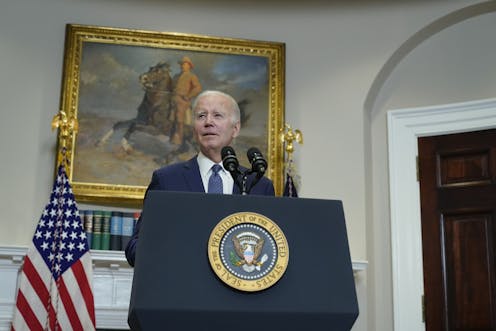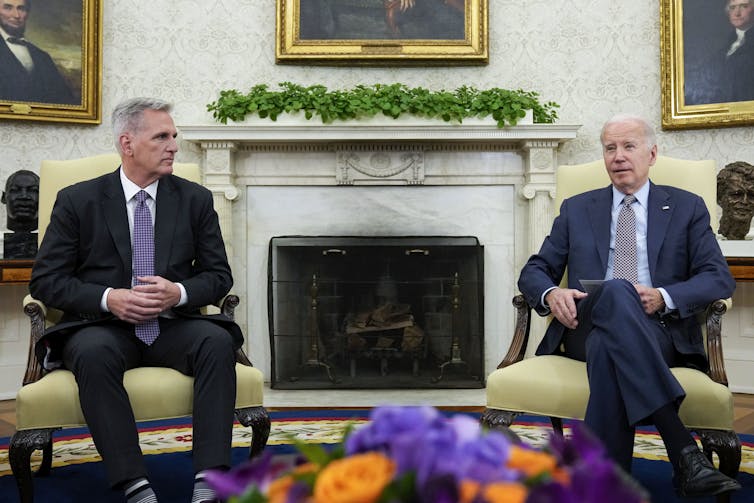Source: The Conversation (Au and NZ) – By Jared Mondschein, Director of Research, US Studies Centre, University of Sydney

Manuel Balce Ceneta/AP/AAP
Congress appears to be on the cusp of passing legislation that would not only avoid an unprecedented US government default – and economic catastrophe – but also provide some much-needed political stability in Washington.
Both Republicans and Democrats are claiming victory in the deal and a loss for the other.
From the Republican point of view, the deal will bring
historic reductions in spending, consequential reforms that will lift people out of poverty […] and rein in government overreach.
Key Republican demands included:
-
new work requirements for those seeking federal government assistance, meaning more Americans will enter the workforce instead of being paid not to work
-
fewer government regulations around infrastructure projects
-
a US$20 billion (A$30.5 billion) cut to the Internal Revenue Service budget in 2024
-
a cap on non-defence government spending and federal relief of student loans.
From the Democratic point of view, the agreement raises the debt ceiling beyond the 2024 elections, does not cut discretionary spending and contains a fraction of the cuts the Republican-controlled House of Representatives had passed in their earlier proposals.
And on the concessions mentioned previously, Democrats are touting:
-
the new work requirements are minimal and will not affect Medicare recipients
-
the streamlining of regulations around infrastructure projects is far more limited than what Republicans had initially sought
-
the cuts to the IRS budget are a fraction of the recently passed US$80 billion (A$122 billion) budget increase
-
government spending was likely to face limits due to appropriation processes anyway, and student loan payments were already due to restart.
Washington maybe isn’t broken
US President Joe Biden campaigned in the 2020 elections as a unifier who prioritised his ability to reach across the aisle and lower the levels of political animosity.
As a result, these are the sorts of political arguments – in which both sides argue over who won – that he is all too glad to have.
In today’s political climate, where polarisation has resulted in decreasing levels of bipartisanship, it can feel like the only thing both sides can agree on is that disagreements are too great to be overcome.
Most US citizens and politicians will agree that Washington is broken and the government does not function as well as it should.
The nature of the debt-ceiling agreement makes clear there is, at least in this instance, bipartisan political leadership in favour of specific legislation instead of endless rhetoric that everything in Washington is broken.

Alex Brandon/AP
Few, if any, US presidents have assumed office with more political experience than Biden. Having arrived in Washington half a century ago, he is acutely familiar with how to negotiate in a manner that allows both sides to claim victory.
Biden has also remained consistently confident about his ability to do so despite bipartisan pessimism. As much as it pays political dividends to campaign on the idea that Washington is so broken only an outsider can fix it, Biden would argue instead that a president with five decades of experience as a “Washington insider” actually makes government function better, not worse.
Crafting a deficit agreement that allows both Republican House Speaker Kevin McCarthy and Biden to claim victory – in the wake of other bipartisan legislation ranging from infrastructure and semiconductor manufacturing to veteran health care – is the sort of proof of results that Biden would say comes from such experience.
Biden made his approach to the budget negotiations clear. The agreement is a compromise, he said, in which “no one got everything they want, but that’s the responsibility of governing”.
The president believes these sorts of compromises help restore trust and optimism about the US government actually being capable of responsible governing.
Read more:
Voters want compromise in Congress — so why the brinkmanship over the debt ceiling?
Why does this matter to the world?
As the world’s largest economy with a debt that is foundational to the global economy, a default would do far more than create chaos in the US$24 trillion Treasury debt market. It would ultimately upend financial markets and create international turmoil.
Indeed, the catastrophic economic consequences of a default would be so widespread that it is difficult to quantify. It would have almost certainly led to a recession.
But aside from the most dire of scenarios, these budget negotiations have had direct implications for the rest of the world – far larger than the mere cancelling of Biden’s planned trip to Australia this month.
As my colleagues recently argued, the last US debt-ceiling negotiations, during the Obama administration in 2011, resulted in the Budget Control Act. This law constrained US defence strategy in the Indo-Pacific to such an extent that US foreign policy has still not entirely recovered.
As the then US secretary of defence, James Mattis, said:
No enemy in the field has done as much to harm the readiness of the US military than the combined impact of the Budget Control Act’s defence spending caps.
What to expect next?
Former Democratic House Speaker Nancy Pelosi famously only allowed legislation to be voted on that she knew had the requisite Democratic votes to get passed.
With one of the slimmest possible majorities in the House, McCarthy only won his role as speaker after more than a dozen votes. Few had complete confidence he would ultimately get the job. As a result, McCarthy will rarely – if ever – be able to take a Pelosi-like approach to voting during his speakership.
With the debt-ceiling legislation, McCarthy may again be forced go to the House floor without complete confidence in Republican support. He and centrist Republicans will instead be relying on some centrist Democrats voting in favour of the legislation.
This reality has forced McCarthy to simultaneously tout the proposal to Republicans as exceedingly conservative, but still enough of a compromise to win over some Democrats. Even then, there may once again be symbolic votes against the legislation the first time it is put to the floor in order for some representatives to register a protest with their constituents.
Biden and McCarthy will now need to weather the storm from their respective left and right flanks to secure the agreement’s passage. But they are ultimately hoping this deal will remove one more obstacle to a better-functioning Washington, where political brinkmanship has continued to challenge an otherwise significant resurgence of US strength at home and leadership abroad.
While failure to raise the debt limit would have been unprecedented, a lowering of Washington’s political antagonism increasingly feels unprecedented, too.
![]()
Jared Mondschein does not work for, consult, own shares in or receive funding from any company or organization that would benefit from this article, and has disclosed no relevant affiliations beyond their academic appointment.
– ref. Can high-stakes debt-ceiling brinkmanship in the US lead to unprecedented political unity? – https://theconversation.com/can-high-stakes-debt-ceiling-brinkmanship-in-the-us-lead-to-unprecedented-political-unity-206586




